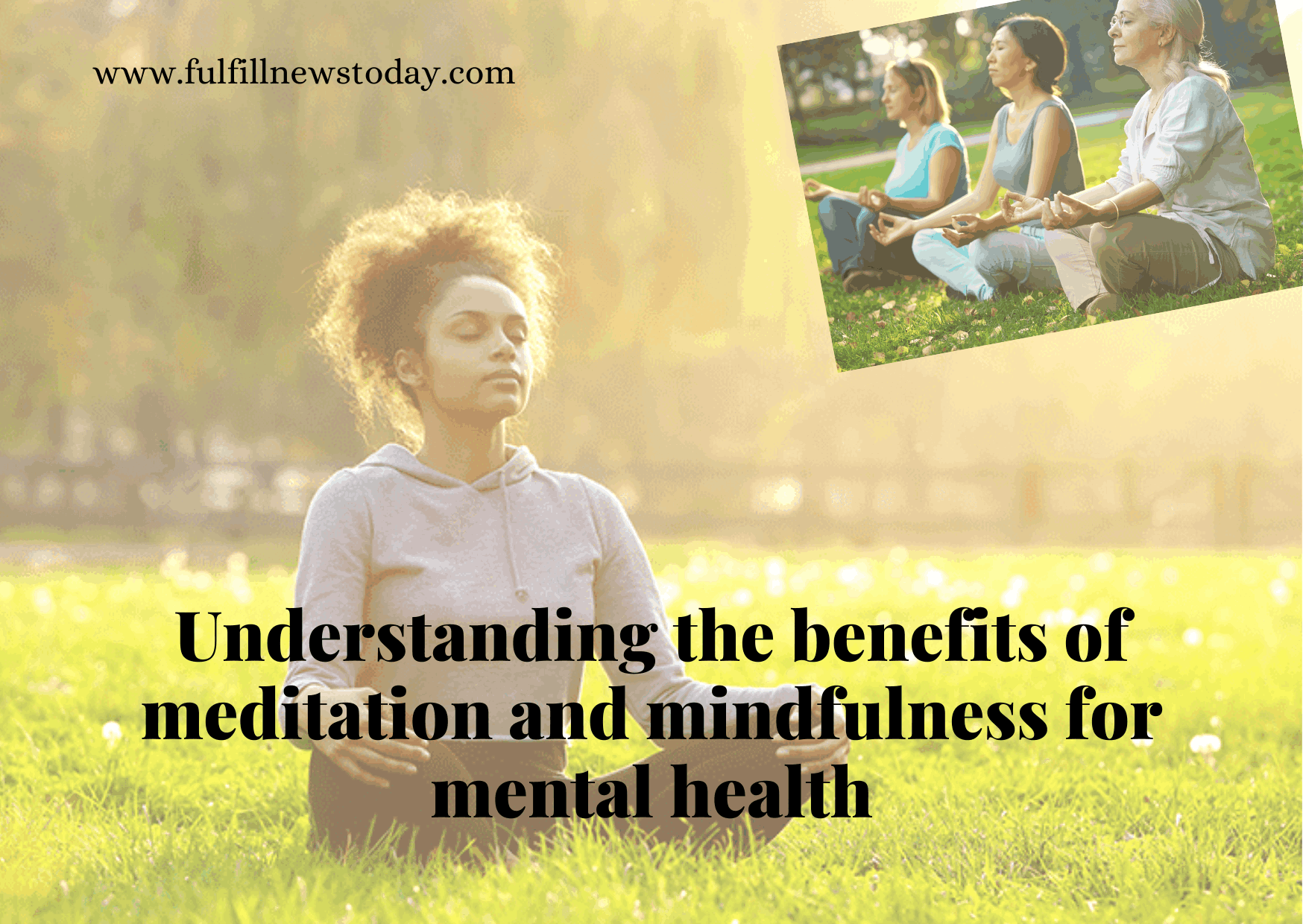Meditation and mindfulness practices have gained popularity in recent years as effective tools for improving mental health. These practices involve intentionally focusing on the present moment and cultivating a non-judgmental awareness of one’s thoughts, feelings, and surroundings.
While they have their roots in ancient Eastern spiritual traditions, meditation, and mindfulness are increasingly being embraced by Western medicine as evidence-based interventions for various mental health conditions.

In this blog post, we’ll explore the benefits of meditation and mindfulness for mental health, how they work, and how you can get started with regular practice. Whether you’re looking to reduce stress, manage anxiety, or enhance your overall well-being, the benefits of meditation and mindfulness are worth exploring.
Benefits of meditation for mental health :
Meditation has been shown to have numerous benefits for mental health. One of the most significant benefits is the reduction of stress and anxiety. Studies have found that regular meditation practice can lower levels of the stress hormone cortisol, leading to a greater sense of calm and relaxation.
- Reduced stress and anxiety
- Improved focus and concentration
- Better sleep quality
- Enhanced emotional regulation
- Reduced symptoms of depression
Meditation can also improve focus and concentration, as well as increase feelings of emotional stability and resilience. Another benefit of meditation is improved sleep quality, which is crucial for overall mental and physical health.
Furthermore, meditation has been shown to reduce symptoms of depression, such as negative thinking and lack of motivation. Overall, the practice of meditation can help individuals manage their mental health in a more effective way and improve their overall sense of well-being.
Benefits of mindfulness for mental health :
Mindfulness is a form of meditation that involves paying attention to the present moment in a non-judgmental and accepting way. This practice has been shown to have a range of benefits for mental health. For example, mindfulness can increase self-awareness, which allows individuals to better recognize and understand their thoughts and emotions.
This increased self-awareness can help individuals regulate their emotions more effectively and make better decisions in their lives. Additionally, mindfulness can improve relationships and communication by helping individuals stay present and attentive in their interactions with others.
Mindfulness can also enhance a sense of purpose and meaning in life by promoting a greater appreciation for the present moment and fostering a deeper connection with oneself and others. Furthermore, research has shown that mindfulness can reduce symptoms of post-traumatic stress disorder (PTSD) by helping individuals stay grounded in the present moment and not get caught up in past traumatic events.
Overall, the practice of mindfulness has been found to have a range of positive effects on mental health, making it a valuable tool for anyone looking to enhance their well-being.
How meditation and mindfulness work :
Meditation and mindfulness practices work by inducing a state of relaxation and inner awareness. During meditation and mindfulness, individuals focus their attention on a specific object or sensation, such as the breath or a mantra, while non-judgmentally acknowledging any thoughts or distractions that arise. This process helps to quiet the mind and reduce mental chatter, allowing individuals to become more present and aware in the moment.

Research has shown that meditation and mindfulness practices can have a range of physiological and neurological effects. For example, these practices have been found to reduce activity in the amygdala, the part of the brain responsible for the fight-or-flight response, which can help to reduce stress and anxiety.
Additionally, meditation and mindfulness can increase activity in the prefrontal cortex, the part of the brain responsible for executive function, decision-making, and emotional regulation. This increased activity can improve cognitive performance and enhance emotional regulation, making individuals more resilient to stress and better able to manage their emotions.
Moreover, meditation and mindfulness practices can have a range of physical benefits. They have been found to lower blood pressure, reduce inflammation, and boost the immune system.
Regular practice of meditation and mindfulness can also lead to changes in brain structure, including increased gray matter density in areas associated with attention, memory, and emotional regulation.
Overall, meditation and mindfulness work by inducing a state of relaxation and inner awareness, which can have a range of positive effects on mental and physical health.
Types of meditation and mindfulness practices :
There are many different types of meditation and mindfulness practices, each with its own unique focus and approach. Here are a few of the most popular types of meditation and mindfulness practices:
Mindfulness Meditation:
This practice involves focusing on the breath and bringing awareness to the present moment without judgment. It is a simple and accessible form of meditation that can be practiced anywhere, anytime.
Loving-Kindness Meditation:
This practice involves cultivating feelings of love, kindness, and compassion toward oneself and others. It can help to reduce feelings of anger, resentment, and anxiety, and improve overall well-being.
Transcendental Meditation:
This practice involves the use of a mantra, a word or phrase repeated silently, to quiet the mind and achieve a state of deep relaxation. It is often practiced for 20 minutes twice a day.
Tips for starting a meditation or mindfulness practice :
If you’re new to meditation and mindfulness, it can be challenging to know where to start. Here are some tips to help you begin:
Find a quiet space: Choose a quiet, comfortable space where you can practice without distractions.
Start with a few minutes a day: Don’t try to meditate or practice mindfulness for long periods right away. Start with just a few minutes a day and gradually work your way up.
Use a guided meditation app or video: There are many guided meditation apps and videos available that can help you get started. These can provide structure and guidance as you begin your practice.
Set a routine: Try to practice at the same time each day. This will help you develop a routine and make your practice a habit.
Be patient and kind to yourself: Meditation and mindfulness are skills that take time and practice to develop. Be patient with yourself and don’t expect to be perfect right away. If you find your mind wandering during your practice, simply bring your attention back to your breath or the present moment.
Conclusion :
Meditation and mindfulness practices offer numerous benefits for mental health, including reduced stress and anxiety, improved focus and concentration, better sleep quality, enhanced emotional regulation, and decreased symptoms of depression and PTSD.

By intentionally focusing on the present moment and cultivating a non-judgmental awareness of our thoughts and feelings, we can improve our overall well-being and develop greater self-awareness, purpose, and meaning in life.
Whether you’re just getting started with a meditation or mindfulness practice or you’re looking to deepen your existing practice, the tips and resources available can help you stay on track and reap the benefits of these powerful practices. So why not give it a try and see how it can benefit your mental health and well-being?
Read More: The Art of Communication in Marriage: “How to Listen and Be Heard”
